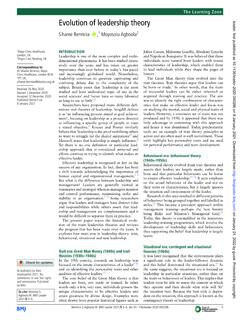Transcription of The Meaning of fiSocial Entrepreneurshipfl J. Gregory Dees
1 1 The Meaning of Social Entrepreneurship J. Gregory Dees Original Draft: October 31, 1998 Reformatted and revised: May 30, 2001 The idea of social entrepreneurship has struck a responsive chord. It is a phrase well suited to our times. It combines the passion of a social mission with an image of business-like discipline, innovation, and determination commonly associated with, for instance, the high-tech pioneers of Silicon Valley. The time is certainly ripe for entrepreneurial approaches to social problems. Many governmental and philanthropic efforts have fallen far short of our expectations.
2 Major social sector institutions are often viewed as inefficient, ineffective, and unresponsive. Social entrepreneurs are needed to develop new models for a new century. The language of social entrepreneurship may be new, but the phenomenon is not. We have always had social entrepreneurs, even if we did not call them that. They originally built many of the institutions we now take for granted. However, the new name is important in that it implies a blurring of sector boundaries. In addition to innovative not-for-profit ventures, social entrepreneurship can include social purpose business ventures, such as for-profit community development banks, and hybrid organizations mixing not-for-profit and for-profit elements, such as homeless shelters that start businesses to train and employ their residents.
3 The new language helps to broaden the playing field. Social entrepreneurs look for the most effective methods of serving their social missions. Though the concept of social entrepreneurship is gaining popularity, it means different things to different people. This can be confusing. Many associate social entrepreneurship exclusively with not-for-profit organizations starting for-profit or earned-income ventures. Others use it to describe anyone who starts a not-for-profit organization. Still others use it to refer to business owners who integrate social responsibility into their operations.
4 What does social entrepreneurship really mean? What does it take to be a social entrepreneur? To answer these questions, we should start by looking into the roots of the term entrepreneur. Origins of the Word Entrepreneur In common parlance, being an entrepreneur is associated with starting a business, but this is a very loose application of a term that has a rich history and a much more significant Meaning . The term entrepreneur originated in French economics as early as the 17th and 18th centuries. In French, it means someone who undertakes, not an undertaker in the sense of a funeral director, but someone who undertakes a significant project or activity.
5 More specifically, it came to be used to identify the venturesome individuals who stimulated economic progress by finding new and better ways of doing things. The French economist most commonly credited with giving the term this particular Meaning is Jean Baptiste Say. Writing around the turn of the 19th century, Say put it this way, The entrepreneur shifts economic resources out of an area of lower and into an area of higher productivity and greater yield. Entrepreneurs create value. In the 20th century, the economist most closely associated with the term was Joseph Schumpeter.
6 He described entrepreneurs as the innovators who drive the creative-destructive process of capitalism. In his words, the function of entrepreneurs is to reform or revolutionize the pattern of production. They can do this in many ways: by exploiting an invention or, more generally, an untried technological possibility for producing a new commodity or producing an old one in a new way, by opening up a new source of supply of materials or a new outlet for products, by reorganizing an industry and so on. Schumpeter s entrepreneurs are the change agents in the economy.
7 By serving new markets or creating new ways of doing things, they move the economy forward. It is true that many of the entrepreneurs that Say and Schumpeter have in mind serve their function by starting new, profit-seeking business ventures, but starting a business is not the essence of entrepreneurship. Though other economists may have used the term with various nuances, the Say-Schumpeter tradition that identifies 2entrepreneurs as the catalysts and innovators behind economic progress has served as the foundation for the contemporary use of this concept.
8 Current theories of Entrepreneurship Contemporary writers in management and business have presented a wide range of theories of entrepreneurship. Many of the leading thinkers remain true to the Say-Schumpeter tradition while offering variations on the theme. For instance, in his attempt to get at what is special about entrepreneurs, Peter Drucker starts with Say s definition, but amplifies it to focus on opportunity. Drucker does not require entrepreneurs to cause change, but sees them as exploiting the opportunities that change (in technology, consumer preferences, social norms, etc.)
9 Creates. He says, this defines entrepreneur and entrepreneurship the entrepreneur always searches for change, responds to it, and exploits it as an opportunity. The notion of opportunity has come to be central to many current definitions of entrepreneurship. It is the way today s management theorists capture Say s notion of shifting resources to areas of higher yield. An opportunity, presumably, means an opportunity to create value in this way. Entrepreneurs have a mind-set that sees the possibilities rather than the problems created by change.
10 For Drucker, starting a business is neither necessary nor sufficient for entrepreneurship. He explicitly comments, Not every new small business is entrepreneurial or represents entrepreneurship. He cites the example of a husband and wife who open another delicatessen store or another Mexican restaurant in the American suburb as a case in point. There is nothing especially innovative or change-oriented in this. The same would be true of new not-for-profit organizations. Not every new organization would be entrepreneurial.








